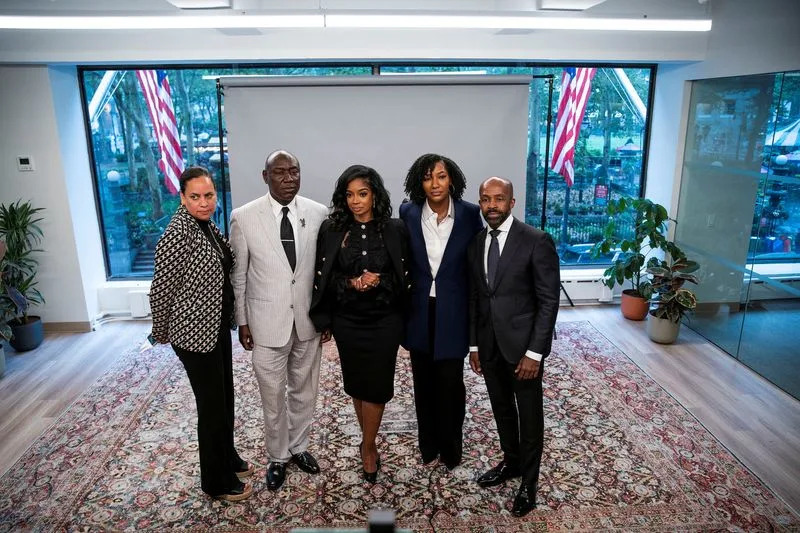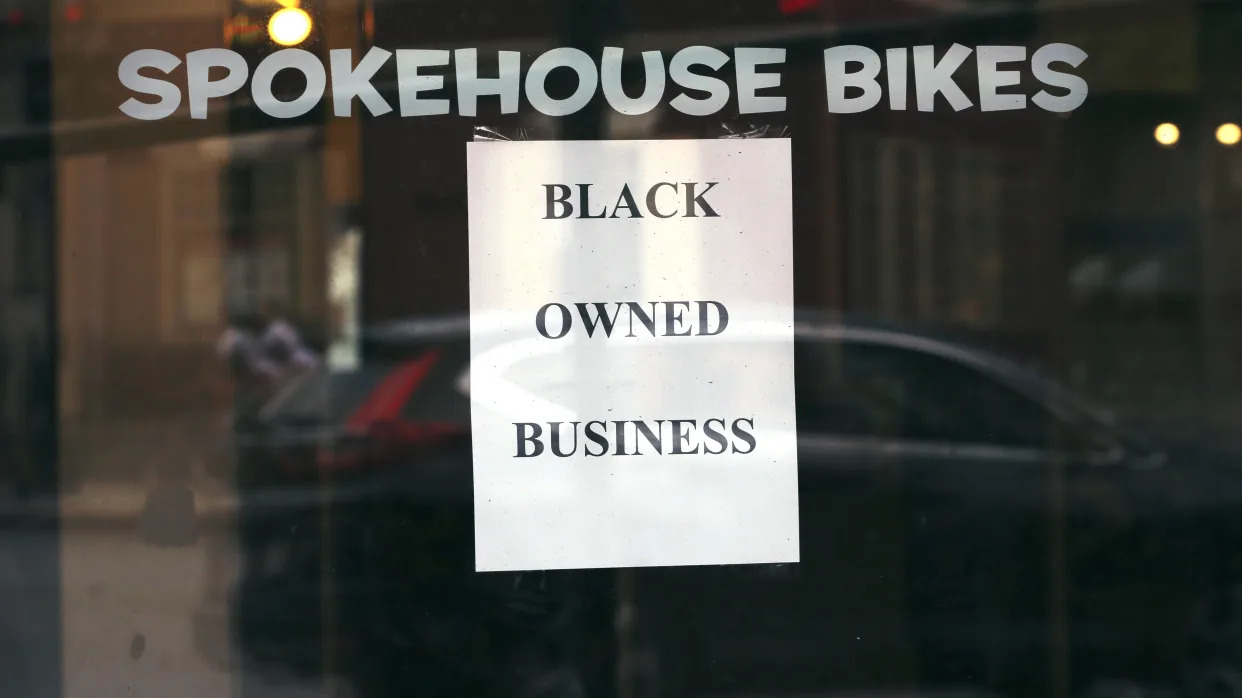Nate Raymond
Updated Sat, September 30, 2023

FILE PHOTO: Black women-owned venture capital fund to respond to conservative activist's lawsuit
By Nate Raymond
(Reuters) -A federal appeals court on Saturday blocked a venture capital fund from moving forward with a program that awards funding to businesses run by Black women in a case by the anti-affirmative action activist behind the successful U.S. Supreme Court challenge to race-conscious college admissions policies.
The Atlanta-based 11th U.S. Circuit Court of Appeals on a 2-1 vote granted a request by Edward Blum's American Alliance for Equal Rights to temporarily block Fearless Fund from considering applications for grants only from businesses led by Black women.
Blum's group asked the court to do so while it appealed a judge's Tuesday ruling denying it a preliminary injunction blocking Fearless Fund from moving forward with its "racially exclusive program." Grant applications were due Saturday.
The judges in the majority, U.S. Circuit Judges Robert Luck and Andrew Brasher, agreed with Blum's group that Fearless Fund's "racially exclusionary" grant program likely violated Section 1981 of the 1866 Civil Rights Act, a Civil War-era law that bars racial bias in contracting.
U.S. District Judge Thomas Thrash earlier this week concluded that under the U.S. Constitution's First Amendment's free speech protections, Fearless Fund had a right to express its belief in the importance of Black women to the economy through charity.
But the appeals court's majority, comprised of two appointees of Republican former President Donald Trump, said the First Amendment "does not give the defendants the right to exclude persons from a contractual regime based on race."
Blum in a statement said his group was "gratified that the 11th Circuit has recognized the likelihood that the Fearless Strivers Grant Contest is illegal." Defense lawyers said they planned to seek further appellate review.
"We remain committed to defending our clients’ meaningful work," said Jason Schwartz, a lawyer for Fearless Fund.
Fearless Fund describes itself as "built by women of color for women of color."
The lawsuit is one of three that Blum's Texas-based group has filed since August challenging grant and fellowship programs designed by the venture capital fund and two law firms to help give Black, Hispanic and other underrepresented minority groups greater career opportunities.
A different group founded by Blum, who is white, was behind the litigation that led to the June decision, powered by the Supreme Court's 6-3 conservative majority, declaring unlawful race-conscious student admissions policies used by Harvard University and the University of North Carolina.
According to the Fearless Fund, businesses owned by Black women in 2022 received less than 1% of the $288 billion that venture capital firms deployed.
The fund aims to address that disparity, and counts JPMorgan Chase, Bank of America and MasterCard as investors. It has invested nearly $27 million in 40 businesses led by minority women since its founding in 2019.
It also provides grants, and Blum's lawsuit took aim at its Fearless Strivers Grant Contest, which awards Black women who own small businesses $20,000 in grants and other resources to grow their businesses.
The fund argued Blum was trying to "turn a seminal civil rights statute on its head" by suing it under a Civil War-era law enacted to protect formerly enslaved Black people from racial bias.
U.S. Circuit Judge Charles Wilson, an appointee of Democratic former President Bill Clinton, in a dissenting opinion on Saturday called it a "perversion" of Congress' intent to use that law against a remedial program like Fearless Fund's.
(Reporting by Nate Raymond in Boston; Editing by Alexia Garamfalvi, Andrea Ricci and Leslie Adler)
Federal court temporarily blocks race-based grant program
Olivia Alafriz
POLITICO
Sat, September 30, 2023

Charles Krupa/AP photo
A federal appeals court on Saturday temporarily blocked a grant program for Black women-owned businesses.
American Alliance for Equal Rights, a nonprofit backed by conservative legal activist Edward Blum, sued the Atlanta-based Fearless Fund in August, alleging that the venture capital fund’s grant program violated the 1866 Civil Rights Act’s “guarantee of race neutrality” in making “contracts” by discriminating against other races.
The lawsuit follows a Supreme Court decision in June that struck down race-based affirmative action in higher education after challenges brought by Students for Fair Admissions, a group also backed by Blum.
After a district court judge in Georgia refused to issue an injunction earlier this week, the U.S. Court of Appeals for the 11th Circuit granted the injunction in a 2-1 decision on Saturday. Robert Luck and Andrew Brasher, both appointed by former President Donald Trump, were in favor. Charles Wilson, appointed by former President Bill Clinton, dissented.
The targeted program intends to support Black women-owned businesses by awarding grants and providing mentorship and business support services — however, in the Saturday opinion, the judges said that it was “substantially likely” that the program was illegal.
Blum has filed similar suits against several businesses that he says use the same kind of racial classifications previously used in higher education admissions — such programs are likely the next target for conservative legal activism.
Sat, September 30, 2023

Charles Krupa/AP photo
A federal appeals court on Saturday temporarily blocked a grant program for Black women-owned businesses.
American Alliance for Equal Rights, a nonprofit backed by conservative legal activist Edward Blum, sued the Atlanta-based Fearless Fund in August, alleging that the venture capital fund’s grant program violated the 1866 Civil Rights Act’s “guarantee of race neutrality” in making “contracts” by discriminating against other races.
The lawsuit follows a Supreme Court decision in June that struck down race-based affirmative action in higher education after challenges brought by Students for Fair Admissions, a group also backed by Blum.
After a district court judge in Georgia refused to issue an injunction earlier this week, the U.S. Court of Appeals for the 11th Circuit granted the injunction in a 2-1 decision on Saturday. Robert Luck and Andrew Brasher, both appointed by former President Donald Trump, were in favor. Charles Wilson, appointed by former President Bill Clinton, dissented.
The targeted program intends to support Black women-owned businesses by awarding grants and providing mentorship and business support services — however, in the Saturday opinion, the judges said that it was “substantially likely” that the program was illegal.
Blum has filed similar suits against several businesses that he says use the same kind of racial classifications previously used in higher education admissions — such programs are likely the next target for conservative legal activism.
‘We Won the First Round’: Federal Judge Denies Conservative Activist Behind SCOTUS’ Affirmative Action Reversal Request to Block Venture Fund for Black Women-Owned Businesses
Niko Mann
Fri, September 29, 2023
A federal judge denied a request to block a small venture capital fund from providing grants to Black women starting their own businesses.
U.S. District Judge Thomas Thrash denied the request on Sept. 26, which was made by conservative activist Edward Blum and his nonprofit American Alliance for Equal Rights.
Blum filed a federal lawsuit claiming that the Fearless Fund Management violated the Civil Rights Act of 1866 because only Black women are eligible for the $20,000 grants. According to Reuters, Thrash denied the request for an injunction pending an appeal in a federal court in Atlanta.”

Conservative Edward Blum attacks a venture capital fund that provides grants to Black women. (Photo: MSNBC/ YouTube screenshot)
“Blum sought an injunction to block the Fearless Fund from awarding grants for what he called a “racially exclusive program.”
The fund was reportedly created in 2019 by entrepreneur Arian Simone, executive Ayana Parsons, and “The Cosby Show” actress Keshia Knight Pulliam to provide funding for women of color. It offers grants to women-owned and women-led businesses.
Blum’s group filed an emergency appeal on September 23, requesting that the 11th U.S. Circuit Court of Appeals block the fund from selecting a grant recipient. However, the judge ruled that the Fearless Fund’s grant program is a form of speech protected by the U.S. Constitution’s First Amendment.
The Washington Post shared a statement from Arian Simone and Ayana Parsons following the ruling, highlighting the significant barriers women of color continue to face in accessing capital. In 2022, businesses owned by Black women received less than one percent of the $288 billion invested by venture capital firms.
The statement read, “Women of color continue to face significant barriers in obtaining access to capital. We are very pleased with the court’s decision to deny the plaintiffs’ attempt to shut down our grant program and look forward to continuing to advance our critical mission.”
The Rev. Al Sharpton was in Atlanta to support the Fearless Fund and spoke in front of the courthouse after the ruling. Sharpton emphasized that the fund is not discriminatory and was created to combat discrimination against women of color. “We won the first round,” he said.
Simone also spoke out following the decision and expressed her gratitude to those in attendance.
“Along with my partner Ayana Parsons, we have founded the nation’s first venture capital fund that is created by women of color for women of color,” she said. “And we will continue to operate the nation’s first venture capital fund that is built by women of color for women of color.”
Sharpton shared a video on social media with the caption, “We came to ATL to stand against those who seek to undo generations of hard-won civil rights because this country needs to move forward on equality – not backward… Today, I’m proud to have stood with #FearlessFund in that courtroom as the judge denied the preliminary injunction.'”
Blum is the founder of Students for Fair Admissions, the group that filed a lawsuit against affirmative action policies at Harvard University and the University of North Carolina. In June, the U.S. Supreme Court ruled that race can no longer be considered in college admissions, effectively ending affirmative action in college admissions.
Blum, a white conservative who has faced criticism for his stance, is also involved in a lawsuit against two law firms that provide grants for Black, Hispanic, and underrepresented minorities in terms of career opportunities. Blum alleges that these firms discriminate against white candidates.
“Excluding students from these prestigious fellowships based on their race is unfair, polarizing, and illegal,” said Blum.
The Fearless Fund is represented by the NAACP Legal Defense Fund, Gibson Dunn & Crutcher, and civil rights attorney Ben Crump.”
Georgia federal judge rejects conservative activist group’s effort to halt grant funding for Black women
Isabel Rosales and Jaide Timm-Garcia, CNN
Tue, September 26, 2023

Shuran Huang/The Washington Post/Getty Images
A federal judge in Atlanta has denied a conservative group’s request for an injunction to stop a Black women-owned venture capitalist firm from awarding grants exclusively to Black women entrepreneurs.
The American Alliance for Equal Rights (AAER ) had argued that the Fearless Fund’s grant program amounted to racial discrimination under the Civil Rights Act of 1866.
Judge Thomas Thrash, Jr., Senior U.S. District Judge of Northern District of Georgia, denied the group’s request for a preliminary injunction to halt the firm’s grant selection process while the lawsuit goes to trial, saying the case was a matter of free speech and charitable donations fall under the purview of the First Amendment.
“The judge’s ruling today tells me that there are people in this world who respect progress and allow people to express their freedom of speech, and we are so grateful,” Fearless Fund co-founder and CEO Arian Simone told CNN. “It’s encouraging to know that laws are still in place to protect us.”
AAER told CNN they are “disappointed” with the court’s denial and have appealed the decision.
“Our nation’s civil rights laws do not permit racial distinctions because some racial groups are overrepresented in various endeavors, while others are under-represented,” said AAER founder Edward Blum in an email response to CNN.
Blum is the same conservative activist behind Students for Fair Admissions, Inc. v. President and Fellows of Harvard College, the Supreme Court case whose June ruling dismantled affirmative action in college admissions.
Fearless Fund is an Atlanta-based company that was started in 2019 to break down the barriers Black women face trying to secure resources and funding for growing their business. Their website lists corporate giants including Bank of America, JPMorgan Chase, Fifth Third Bank and Mastercard as partners. Fearless Fund runs a separate non-profit organization called the Fearless Foundation, where it gives charitable donations and grants to women of color entrepreneurs, according to co-founder and COO Ayana Parsons.
Simone said the venture capitalist firm is the first of its kind “built by women of color, for women of color.”
“Women of color are the least funded but the most founded,” said Simone, adding that Black women statistically make up the majority of small business owners, but receive the least amount of funding compared to other demographics.
It was one of Fearless Foundation’s grants, the Strivers Grant Contest, which exclusively awards Black women entrepreneurs up to $20,000, that was the target of AAER’s complaint.
In early August, Blum filed a lawsuit on behalf of AAER against the Fearless Fund and its foundation. The group argued that their members, un-named in the lawsuit, were excluded from the program because they weren’t Black, and faced “additional harm” from the illegal act of racial discrimination, AAER’s attorneys stated in the court hearing.
Blum told CNN that “venture capital funding gaps between the races is never a legal or moral justification to exclude certain men and women from public programs by race or ethnicity.”
He added that AAER “believes it is legally permissible to provide benefits to businesses and individuals who are under-resourced but those benefits must be made available to all races and ethnicities.”
During closing remarks, Judge Thrash said his understanding was that the Fearless Fund is trying to get a message across that Black women lack access to capital funds, a problem they recognize and are trying to address.
“The Plaintiff wants them to communicate a different message,” Thrash said. “That’s not the way it works.”
AAER’s attorneys declined to comment after the hearing.
The lawsuit caught the attention of civil rights activist and leader Rev. Al Sharpton, who said he views it as evidence the fight over affirmative action is expanding beyond school grounds. In a news release on Monday, Rev. Sharpton said that the case could have larger consequences for DEI initiatives across corporate America and could pave the way for future lawsuits “targeting race-conscious diversity programs … across all kinds of public and private sectors.”
In the month after the Supreme Court’s landmark affirmative action decision, conservatives put top Fortune 100 companies on notice. Thirteen Republican state attorneys general sent a letter to top companies including Apple, Google, Netflix and others, arguing the court’s ruling on affirmative action also applied to employers.
“[We] write to remind you of your obligations as an employer under federal and state law to refrain from discriminating on the basis of race, whether under the label of ‘diversity, equity, and inclusion’ or otherwise,” the letter read. “Treating people differently because of the color of their skin, even for benign purposes, is unlawful and wrong. Companies that engage in racial discrimination should and will face serious legal consequences.”
Outside the federal courthouse after the judge denied AAER’s motion, Sharpton stood with Simone and Parsons, the Fearless Fund co-founders.
“We won the first round but the fight is not over … we’re going to keep on fighting, and we’re going to fight wherever this reactionary group raises his [sic] head,” he told the crowd of supporters and media gathered.
Parsons told CNN that she believes the lawsuit is bigger than the Fearless Fund, venture capital or corporate America.
“I’ve been a corporate executive my entire career, and yes diversity, equity and inclusion is under attack,” she said. “I hope that the American people understand the magnitude of this lawsuit and how it impacts and affects all of us.”
She said Fearless Fund is not afraid of what comes next in the legal process, but emphasized her belief that this is an attempt to dismantle the economic freedom and progress being made in the country.
“This is about anything that is race-conscious decision making and trying to include those that have long been excluded,” Parsons said.
As a Black business owner, Sophia Danner-Okotie said she couldn’t get a loan despite showing proof of growth and contract opportunities she had lined up with retailers.
“We’re definitely under-funded and it’s felt – it’s felt hard,” she told CNN. Danner-Okotie said she has received a $10,000 grant from the Fearless Foundation.
“Not being able to go to a bank and get funding - that kills your courage sometimes, that kills your ambition,” she said. “So Fearless Foundation stepping in and saying, ‘We’re going to help you with this mission. We believe in what you’re doing, and we want to help you grow this business.’ That was a boost to my business and ego as well.”
This is not the end of the line for AAER’s lawsuit. While Judge Thrash denied a preliminary injunction to pause the grant program, the case itself continues in the Northern District.
CNN news
No comments:
Post a Comment